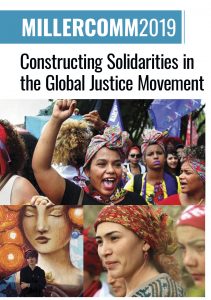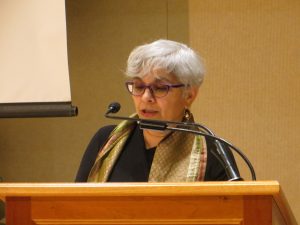Rapporteur: Bansari Patel
 On March 13th, 2019, the Center for Global Studies proudly hosted “MillerComm 2019: Constructing Solidarities in the Global Justice Movement: A Feminist Perspective” presented by Manisha Desai. Desai is currently a Professor of Sociology and Asian and Asian American Studies at the University of Connecticut. Her research and teaching interests include Gender and Globalization, Transnational Feminisms and Women’s Movements, Human Rights movements, and Contemporary Indian Society.
On March 13th, 2019, the Center for Global Studies proudly hosted “MillerComm 2019: Constructing Solidarities in the Global Justice Movement: A Feminist Perspective” presented by Manisha Desai. Desai is currently a Professor of Sociology and Asian and Asian American Studies at the University of Connecticut. Her research and teaching interests include Gender and Globalization, Transnational Feminisms and Women’s Movements, Human Rights movements, and Contemporary Indian Society.
In her talk, Desai focused on comparing two global justice movements – The 2017 International’s Women’s Day Strike in New York, United States, and the 2012 Idle Know More Movement in Ontario, Canada – to construct solidarities between movements of women activists situated in different local and global systems of power. Across the globe, the International’s Women Day Strike takes place annually in March and brings awareness to the various challenges faced by women globally including: labor laws, reproductive rights, gender violence, and many other causes. Idle Know More is also an ongoing movement that began in December 2012 in Ontario, Canada by three indigenous women and one non-native ally. Idle No More aims to advocate for Indigenous inherent rights to sovereignty and reinstitute traditional laws and Nation to Nation Treaties by protecting indigenous lands and waters from corporate destruction.

The International Women’s Strike, a global movement and postcolonial approach, aims to bring international women together while the Idle Know More Movement, a community organized and decolonizing approach, insists on leaving indigenous people, land, and waters unbothered. From studying these movements, Desai interpreted that Decolonized Feminism has more possibilities and demonstrates dependent traits, while Postcolonial Feminism emphasizes spatial differences and promotes independence. In her closing remarks, Desai concluded that although both movements have different visions, no solidarities can be built without love.
Desai’s talk also brought awareness to problems that women all around the world have overcome and the problems that they continue to face, discussing how these issues can be remedied with postcolonial and decolonial efforts. For example, Desai spoke on how the Transnational Women’s Movements primarily attract educated, higher income women because they have more resources. This trend discourages uneducated, lower income women from voicing their concerns and fighting for their never-ending struggles with gender inequality. During her Q&A session, Desai suggested that Latin American feminists prefer Decolonial Feminism while South Asian feminists prefer post-colonial efforts, inferring that postcolonial and decolonial approaches in a region are based strongly upon history and geographical location.
________________________________________________
Bibliography
Desai, Manisha. Gender and the Politics of Possibilities: Rethinking Globalization. Lanham, Rowman & Littlefield Publishers, 2009.
________. Subaltern Movements in India: Gendered Geographies of Struggle against Neoliberal Development. New York, Routledge, 2016.
Desai, Manisha, and Kenneth Cuno. Family, Gender, and Law in a Globalizing Middle East and South Asia. Syracuse, Syracuse University Press, 2009.
Desai, Manisha, and Lynn Walter. The Greenwood Encyclopedia of Women’s Issues Worldwide: Asia and Oceania. Westport, Greenwood Press, 2003.
Desai, Manisha, and Nancy A. Naples. Women’s Activism and Globalization: Linking Local Struggles and Transnational Politics. New York, Routledge, 2002.
Grabe, Shelley. Women’s Human Rights: a Social Psychological Perspective on Resistance, Liberation, and Justice. New York, Oxford University Press, 2018.
Gourley, Catherine. Society’s Sisters: Stories of Women Who Fought for Social Justice in America. Brookfield, Twenty-First Century Books, 2003.
Lyman, Linda L., Jane Strachan, and Angeliki Lazaridou. Shaping Social Justice Leadership: Insights of Women Educators Worldwide. Lanham, Rowman & Littlefield Education, 2012.
Maier, Elizabeth, and Nathalie Lebon. Women’s Activism in Latin America and the Caribbean: Engendering Social Justice, Democratizing Citizenship. New Brunswick, Rutgers University Press, 2010.
Tsomo, Karma Lekshe. Buddhist Women and Social Justice: Ideals, Challenges, and Achievements. Albany, State University of New York Press, 2004.
________________________________________________
Other Resources
Idle No More Website. http://www.idlenomore.ca
International Women’s Strike USA Website. https://www.womenstrikeus.org/

Comments are closed.